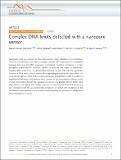Complex DNA knots detected with a nanopore sensor
Author(s)
Doyle, Patrick S.
DownloadPublished version (908.0Kb)
Publisher with Creative Commons License
Publisher with Creative Commons License
Creative Commons Attribution
Terms of use
Metadata
Show full item recordAbstract
Equilibrium knots are common in biological polymers—their prevalence, size distribution, structure, and dynamics have been extensively studied, with implications to fundamental biological processes and DNA sequencing technologies. Nanopore microscopy is a high-throughput single-molecule technique capable of detecting the shape of biopolymers, including DNA knots. Here we demonstrate nanopore sensors that map the equilibrium structure of DNA knots, without spurious knot tightening and sliding. We show the occurrence of both tight and loose knots, reconciling previous contradictory results from different experimental techniques. We evidence the occurrence of two quantitatively different modes of knot translocation through the nanopores, involving very different tension forces. With large statistics, we explore the complex knots and, for the first time, reveal the existence of rare composite knots. We use parametrized complexity, in concert with simulations, to test the theoretical assumptions of the models, further asserting the relevance of nanopores in future investigation of knots.
Date issued
2019-10-02Department
Massachusetts Institute of Technology. Department of Chemical EngineeringJournal
Nature communications
Publisher
Springer Science and Business Media LLC
Citation
Sharma, Rajesh Kumar et al. "Complex DNA knots detected with a nanopore sensor." Nature communications: 10 (2019): 1038 © 2019 The Author(s)
Version: Final published version
ISSN
2041-1723
Keywords
General Biochemistry, Genetics and Molecular Biology, General Physics and Astronomy, General Chemistry